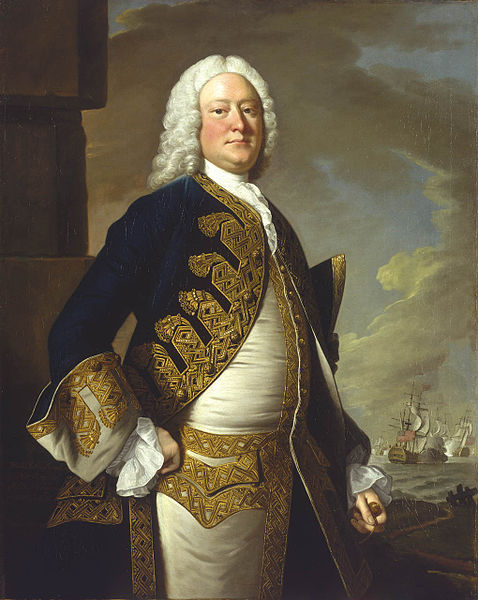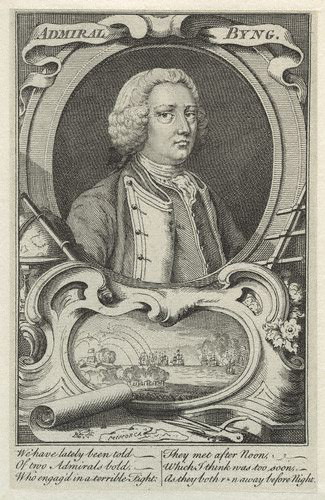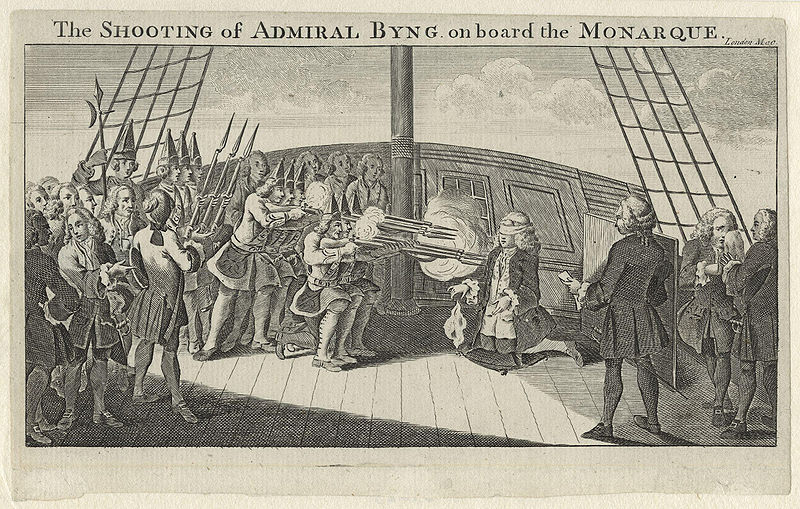<Back to Index>
- Physicist Abram Fyodorovich Ioffe, 1880
- Cartoonist William Henry "Bill" Mauldin, 1921
- Admiral of the Royal Navy John Byng, 1704
PAGE SPONSOR


Admiral John Byng (baptised 29 October 1704 – 14 March 1757) was a Royal Navy officer. After joining the navy at the age of thirteen he participated at the Battle of Cape Passaro in 1718. Over the next thirty years he built up a reputation as a solid naval officer and received promotion to Vice - Admiral in 1747. Byng is best known for the loss of Minorca in 1756 at the beginning of the Seven Years' War. In practice his ships badly needed repair and he was relieved of his command before he could see to his ships or secure the extra forces he also required. He was court - martialled and found guilty of failing to "do his utmost" to prevent Minorca falling to the French following the Battle of Minorca. He was sentenced to death and shot by firing squad on 14 March 1757.
John Byng was born in Bedfordshire, England, the fourth son of Rear - Admiral Sir George Byng (later Admiral the 1st Viscount Torrington).
By the time he entered the Royal Navy in March 1718, aged 13, his father was a well established admiral at the peak of a uniformly successful career, who since supporting King William III in his successful bid to be crowned King of England in 1689 had seen his stature and fortune grow. A highly skilled naval commander, Sir George Byng won distinction in a series of battles and was held in esteem by the monarchs he served. In 1721, he was rewarded by King George I with a viscountcy, being created Viscount Torrington.
Like most younger sons of British nobility, John Byng would have to support himself, since his father's title and estates would ordinarily pass on only to the eldest. However, with such an illustrious father, Byng's rapid promotions through the ranks most likely owed much to his father's influence. The careers of father and son could hardly have ended more differently.
Early in his career, Byng was assigned to a series of Mediterranean postings. In 1723, at age 19, he was made a Lieutenant, and at 23, rose to become Captain of HMS Gibraltar. His Mediterranean service continued until 1739 and was without much action. In 1742, he was appointed Commodore - Governor of the British colony of Newfoundland. He was promoted to Rear - Admiral in 1745, and to Vice - Admiral in 1747. He served on the most comfortable stations, and avoided the more arduous work of the navy. He was Member of Parliament for Rochester from 1751 until his death.
On the approach of the Seven Years' War, the island of Minorca, which had been a British possession since 1708, when it was captured during the War of the Spanish Succession, was threatened by a French naval attack from Toulon, and was invaded in 1756. Byng, then serving in the Channel, was ordered to the Mediterranean to relieve the British garrison of Fort St Philip, at Port Mahon. Despite
his protests, he was not given enough money or time to prepare the
expedition properly. His sailing orders were inexplicably delayed by
five days, and this turned out to be crucial to the lack of success of
the expedition. He set out with ten unseaworthy ships that leaked and
were inadequately manned. Byng's marines were landed to make room for the soldiers who were to reinforce the garrison, and he feared that if he met a French squadron, he would be dangerously undermanned. His
correspondence shows that he left prepared for failure, that he did not
believe that the garrison could hold out against the French force, and
that he was already resolved to come back from Minorca if he found that
the task presented any great difficulty. He wrote home to that effect to
the Admiralty from Gibraltar, whose governor refused to provide soldiers to increase the relief force.
Byng sailed on 8 May. Before he arrived, the French landed 15,000 troops on the western shore of Minorca, spreading out to occupy the island. On 19 May, Byng was off the east coast of Minorca and endeavoured to open communications with the fort. Before he could land any soldiers, the French squadron appeared.
The Battle of Minorca was fought on the following day. Byng, who had gained the weather gage, bore down on the French fleet at an angle, so that his leading ships went into action while the rest, including Byng's flagship, were still out of effective firing range. The French badly damaged the leading ships and slipped away. When his flag captain pointed out to Byng that by standing out of his line, he could bring the centre of the enemy to closer action, he declined because Thomas Mathews had been dismissed for so doing. The French, who were equal in number to the British, sailed away undamaged.
After remaining near Minorca for four days without being able to reestablish communication with the fort or sighting the French, Byng realised that there was little more he could do without effecting badly needed repairs to his ships. As the nearest port available for carrying out repairs and landing his wounded men was Gibraltar, Byng's plan was to sail there, repair his ships, and try once again to get extra forces before returning to Fort St Philip. He accomplished this, and after the reinforcements arrived Byng began preparation for a return to Minorca to relieve the garrison. However, before his fleet could sail, another ship arrived from England with further instructions, relieving Byng of his command and took him back to England, where he was placed into custody. Ironically, Byng was finally promoted to full Admiral on 1 June, following the action off Minorca.
The
garrison on Minorca held out against the overwhelming French numbers
until 29 June, when it was forced to capitulate. Under negotiated terms
the garrison was allowed passage back to England, and the fort and
island came under French control.
The failure to hold Fort St Philip initially caused public outrage among fellow officers and the country at large. Byng was brought home to be tried by court - martial for breach of the Articles of War, which had recently been revised to mandate capital punishment for officers who did not do their utmost against the enemy, either in battle or pursuit.
In 1745, during the War of Austrian Succession, a young lieutenant named Baker Phillips was court - martialed and shot after his ship was captured by the French. His captain, who had done nothing to prepare the vessel for action, was killed almost immediately by a broadside. Taking command, the inexperienced junior officer was forced to surrender the ship when she could no longer be defended. Although the negligent behaviour of Phillips's captain was noted by the subsequent court martial and a recommendation for mercy entered, his sentence was approved by the Lords Justices of Appeal. This injustice angered the nation and the Articles of War were amended to become one law for all: the death penalty for any officer who did not do his utmost against the enemy in battle or pursuit.
The
court martial sitting in judgement on Byng acquitted him of personal
cowardice and disaffection, and convicted him only for not having done
his utmost, since he chose not to pursue the superior French fleet,
instead deciding to protect his own. The
court martial had no discretion under the Articles of War and condemned
Byng to death. However, its members recommended that the Lords of the
Admiralty ask King George II to exercise his royal prerogative of mercy.
The new First Lord of the Admiralty, Lord Temple, was granted an audience with the king to request clemency, but this was refused in an angry exchange. Four members of the board of the court martial petitioned Parliament, seeking to be relieved from their oath of secrecy in order to speak on Byng's behalf. The Commons passed a measure allowing this, but the Lords rejected the proposal.
The Prime Minister, William Pitt the Elder, was aware that the Admiralty was at least partly to blame for the loss at Minorca due to the poor manning and repair of the fleet. Lord Newcastle, the politician responsible, had by now joined the Prime Minister in an uneasy political coalition and this made it difficult for Pitt to contest the court martial verdict as strongly as he would have liked. He did, however, petition the king to commute the death sentence. The appeal was refused: Pitt and King George II were political opponents, with Pitt having pressed for George to relinquish his hereditary position of Elector of Hanover as being a conflict of interest with the government's policies in Europe.
The severity of the penalty, combined with suspicion that the Admiralty sought to protect themselves from public anger over the defeat by throwing all the blame on the admiral, led to a reaction in favour of Byng in both the Navy and the country, which had previously demanded retribution. Pitt, then Leader of the House of Commons, told the king: "the House of Commons, Sir, is inclined to mercy", to which George responded: "You have taught me to look for the sense of my people elsewhere than in the House of Commons."
The
king did not exercise his prerogative. Following the court martial and
pronouncement of sentence, Admiral Byng had been detained aboard HMS Monarch in the Solent,
and on 14 March 1757, he was taken to the quarterdeck for execution. In
the presence of all hands and men from other ships of the fleet in
boats surrounding Monarch, the admiral knelt on a cushion and signified his readiness by dropping his handkerchief, whereupon a platoon of marines shot John Byng dead.
Byng's execution was satirized by Voltaire in his novel Candide. In Portsmouth, Candide witnesses the execution of an officer by firing squad; and is told that "in this country, it is good to kill, from time to time, an admiral to encourage the others" (Dans ce pays-ci, il est bon de tuer de temps en temps un amiral pour encourager les autres).
Byng was the last of his rank to be executed in this fashion, and 22 years after the event the Articles of War were amended to allow "such other punishment as the nature and degree of the offence shall be found to deserve" as an alternative to capital punishment. In 2007, some of Byng's descendants petitioned the government for a posthumous pardon; the Ministry of Defence refused. Members of his family and a group at Southill in Bedfordshire where the Byng family lived continue to seek a pardon.
Byng's execution has been called "the worst legalistic crime in the nation's annals". Nevertheless, it may have influenced the behaviour of later naval officers by helping inculcate "a culture of aggressive determination which set British officers apart from their foreign contemporaries, and which in time gave them a steadily mounting psychological ascendancy". This in turn may have contributed to the success of the Royal Navy and the acquisition and defence of the British Empire, as commanders knew that while there was a chance of failure in battle, not to risk battle was certain to result in punishment. In the words of one historian of the Royal Navy, this "judicial murder" had brutally demonstrated that more was expected of naval officers than just courage and loyalty.
Such policy considerations were no comfort to the family of their victim. Admiral Byng's epitaph at the family vault in All Saints Church, in Southill, Bedfordshire, expresses their view and the view of much of the country:
To the perpetual Disgrace
of PUBLICK JUSTICE
The Honble. JOHN BYNG Esqr
Admiral of the Blue
Fell a MARTYR to
POLITICAL PERSECUTION
March 14th in the year 1757 when
BRAVERY and LOYALTY
were Insufficient Securities
For the
Life and Honour
of a
NAVAL OFFICER
